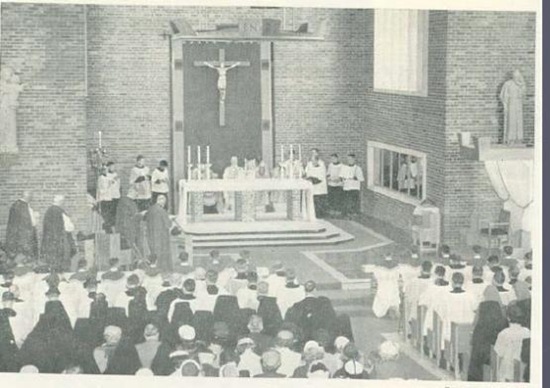Readers will recall the post The Roman Rite in Transition, which supplied some photographic documentation of certain liturgical novelties before and during the Second Vatican Council, when the "Mass of All Ages" was still in use. Among the photographs was the below image of Archbishop O'Hara celebrating the titular feast at Christ the King parish versus turbam in 1954, at the time a brand new parish.
Today New Liturgical Movement has collated pictures of various celebrations of the Assumption from around the world, including a Latin Mass at Christ the King in Kansas City! Notice what is different?
This is more "Forget the Reform" than "Reform of the Reform" methinks.



The only problem is that the turbam in the first photo is a lot bigger than what the other photos show.
ReplyDeleteDear Rad Trad: do you know where could I find some information about the celebrant's position in the Late Antiquity liturgy? I'm reading a paper from La maison-Dieu (1945), where the author repeats all the topics about versus populum as the normal position in ancient times, and my blood is becoming hotter and hotter. I don't know about more recent research on the matter. Thank you!
ReplyDeleteKyrie eleison
A start could be the episode of 'Firing Line' where Davies articulates clearly to a Monsignor that versus populum was only done in a few Roman basilicas in order to face the East.
DeleteAlso, Cardinal Ratzinger's 'The Spirit of the Liturgy' is a good one.
http://www.adoremus.org/0500-Ratzinger.html
http://www.sacredarchitecture.org/articles/the_eschatological_dimension_of_church_architecture/
http://www.bombaxo.com/didascalia.html
Deletechapter xii
I guess you could also look at Uwe Michael Lang's "Turning Toward the Lord."
DeleteHere is a page with links to some relevant articles (ignoring the Reform of the Reform politics): http://www.ccwatershed.org/blog/2013/aug/22/versus-ad-populum-conversus-ad-orientem/
Thank you to all!!
DeleteActually the main point in that article's view is that oriented Liturgy was originally practised only in the East, not in the West, where the placing of altars over martyrs' tombs resulted in an "almost universal" discipline of Mass facing the people - till the "innovation" of oriented prayer and, avove all, the introduction of low Masses gave away with versus populum (in the author's view). The author misses his own point several times, seriously confusing himself. Well, after all it is just a plain apology of the introduction of that practice in the 1940s.
This is the article, for if someone here reads French maybe he wants to laugh for a while:
http://gallica.bnf.fr/ark:/12148/bpt6k6555275r/f95.image.r=La%20Maison-Dieu%20:%20cahiers%20de%20pastorale%20liturgique.langFR
And thank you one more time.
Kyrie eleison
Yeah i get what he's trying to say. But even if he were to make that argument, look at the position of the martyrial basilicas. They're all oriented east-west. So even if the priest faced the congregation it was because he faced east. And he in fact didn't face the congregation but they stood in the side naves. And also their view of the sanctuary was obscured by predecessors of iconostasis and rood screen.
DeleteAlso, that practice was prevalent in Rome. Not in other places.
And himself says that at St. Paul Outside the Walls (the only Roman basilica oriented towards East) Mass was celebrated ad Orientem up to 1823!!
DeleteI don't know about churches outside Rome. I think the basilica of Torcello (Venice) has been thought to have had a versus populum celebration, despite it is oriented towards East. But I have no data anymore. And I agree with you about the iconostasis - this author says that rood screens are an "aberration" from late Middle Ages (¡!¡!¡!)...
Kyrie eleison
That is truly beautiful to see: the evil at its root being made right! And yes, it takes time and dedication to grow a congregation; fortunately, grace has a greater, more powerful effect when it is supplied and received more freely, viz. in the Holy Sacrifice offered to God without the dilution of entertaining the flock.
ReplyDeleteI suppose one could argue the triumph of post-Conciliar orthopraxis over pre-Conciliar heteropraxis. I wonder what Gerard Ellard would have thought?
ReplyDeletePost-Conciliar orthopraxis will become truly orthopractical when they use books prior to the time of the first photograph.
DeleteKyrie eleison